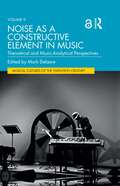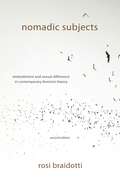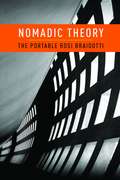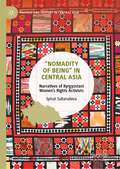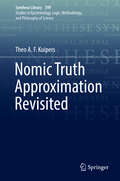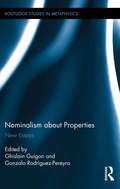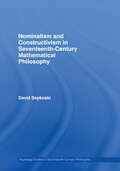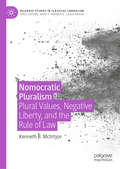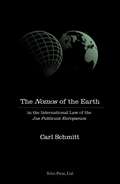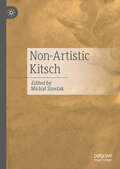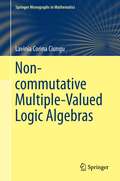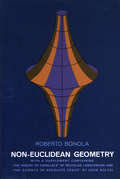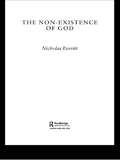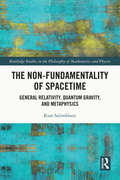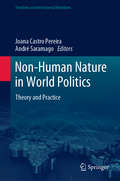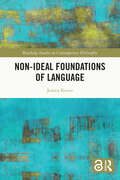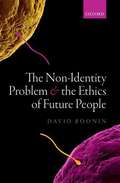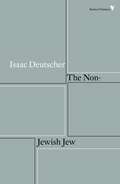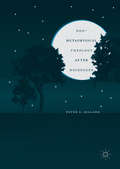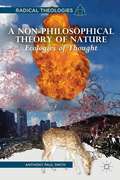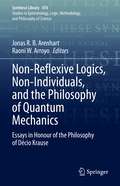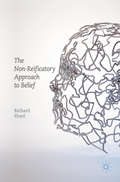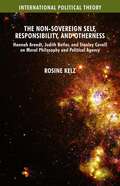- Table View
- List View
Noise as a Constructive Element in Music: Theoretical and Music-Analytical Perspectives (Musical Cultures of the Twentieth Century)
by Mark DelaereMusic and noise seem to be mutually exclusive. Music is generally considered as an ordered arrangement of sounds pleasing to the ear and noise as its opposite: chaotic, ugly, aggressive, sometimes even deafening. When presented in a musical context, noise can thus act as a tool to express resistance to predominant cultural values, to society or to socioeconomic structures (including those of the music industry). The oppositional stance confirms current notions of noise as something which is destructive, a belief not only cherished by hard-core rock bands but also shared by engineers and companies developing devices to suppress or reduce noise in our daily environment.In contrast to the common opinions on noise just described, this volume seeks to explore the constructive potential of noise in contemporary musical practices. Rather than viewing noise as a ‘defect’, this volume aims at studying its aesthetic and cultural potential.Within the noise music study field, most recent publications focus on subgenres such as psychedelic post-rock, industrial, hard-core punk, trash or rave, as they developed from rock and popular music. This book includes work on avant-garde music developed in the domain of classical music as well. In addition to already well-established (social) historical and aesthetical perspectives on noise and noise music, this volume offers contributions by music analysts.
Noise Matters
by R. Haven WileyWe think of noise as background sound that interferes with our ability to hear more interesting sounds. But noise is anything that interferes with the reception of signals of any sort. Whatever its cause, the consequence of noise is error by receivers, and these errors are the key to understanding how noise shapes the evolution of communication.
Nomadic Subjects: Embodiment and Sexual Difference in Contemporary Feminist Theory (Gender and Culture Series)
by Rosi BraidottiFor more than fifteen years, Nomadic Subjects has guided discourse in continental philosophy and feminist theory, exploring the constitution of contemporary subjectivity, especially the concept of difference within European philosophy and political theory. Rosi Braidotti's creative style vividly renders a productive crisis of modernity. From a feminist perspective, she recasts embodiment, sexual difference, and complex concepts through relations to technology, historical events, and popular culture.This thoroughly revised and expanded edition retains all but two of Braidotti's original essays, including her investigations into epistemology's relation to the "woman question;" feminism and biomedical ethics; European feminism; and the possible relations between American feminism and European politics and philosophy. A new piece integrates Deleuze and Guattari's concept of the "becoming-minoritarian" more deeply into modern democratic thought, and a chapter on methodology explains Braidotti's methods while engaging with her critics. A new introduction muses on Braidotti's provocative legacy.
Nomadic Theory: The Portable Rosi Braidotti (Gender And Culture Ser.)
by Rosi BraidottiRosi Braidotti's nomadic theory outlines a sustainable modern subjectivity as one in flux, never opposed to a dominant hierarchy yet intrinsically other, always in the process of becoming, and perpetually engaged in dynamic power relations both creative and restrictive. Nomadic theory offers an original and powerful alternative for scholars working in cultural and social criticism and has, over the past decade, crept into continental philosophy, queer theory, and feminist, postcolonial, techno-science, media, and race studies, as well as into architecture, history, and anthropology. This collection provides a core introduction to Braidotti's nomadic theory and its innovative formulations, which playfully engage with Deleuze, Foucault, Irigaray, and a host of political and cultural issues.Arranged thematically, essays begin with such concepts as sexual difference and embodied subjectivity and follow with explorations in technoscience, feminism, postsecular citizenship, and the politics of affirmation. Braidotti develops a distinctly positive critical theory that rejuvenates the experience of political scholarship. Inspired yet not confined by Deleuzian vitalism, with its commitment to the ontology of flows, networks, and dynamic transformations, she emphasizes affects, imagination, and creativity and the politics of radical immanence. Incorporating ideas from Nietzsche and Spinoza as well, Braidotti establishes a critical-theoretical framework equal parts critique and creation. Ever mindful of the perils of defining difference in terms of denigration and the related tendency to subordinate sexualized, racialized, and naturalized others, she explores the eco-philosophical implications of nomadic theory, feminism, and the irreducibility of sexual difference and sexuality. Her dialogue with technoscience is crucial to nomadic theory, which deterritorializes the established understanding of what counts as human, along with our relationship to animals, the environment, and changing notions of materialism. Keeping her distance from the near-obsessive focus on vulnerability, trauma, and melancholia in contemporary political thought, Braidotti promotes a politics of affirmation that has the potential to become its own generative life force.
Nomadic Theory
by Rosi BraidottiRosi Braidotti's nomadic theory outlines a sustainable modern subjectivity as one in flux, never opposed to a dominant hierarchy yet intrinsically other, always in the process of becoming, and perpetually engaged in dynamic power relations both creative and restrictive. Nomadic theory offers an original and powerful alternative for scholars working in cultural and social criticism and has, over the past decade, crept into continental philosophy, queer theory, and feminist, postcolonial, techno-science, media, and race studies, as well as into architecture, history, and anthropology. This collection provides a core introduction to Braidotti's nomadic theory and its innovative formulations, which playfully engage with Deleuze, Foucault, Irigaray, and a host of political and cultural issues. Arranged thematically, essays begin with such concepts as sexual difference and embodied subjectivity and follow with explorations in technoscience, feminism, postsecular citizenship, and the politics of affirmation. Braidotti develops a distinctly positive critical theory that rejuvenates the experience of political scholarship. Inspired yet not confined by Deleuzian vitalism, with its commitment to the ontology of flows, networks, and dynamic transformations, she emphasizes affects, imagination, and creativity and the politics of radical immanence. Incorporating ideas from Nietzsche and Spinoza as well, Braidotti establishes a critical-theoretical framework equal parts critique and creation. Ever mindful of the perils of defining difference in terms of denigration and the related tendency to subordinate sexualized, racialized, and naturalized others, she explores the eco-philosophical implications of nomadic theory, feminism, and the irreducibility of sexual difference and sexuality. Her dialogue with technoscience is crucial to nomadic theory, which deterritorializes the established understanding of what counts as human, along with our relationship to animals, the environment, and changing notions of materialism. Keeping her distance from the near-obsessive focus on vulnerability, trauma, and melancholia in contemporary political thought, Braidotti promotes a politics of affirmation that has the potential to become its own generative life force.
”Nomadity of Being” in Central Asia: Narratives of Kyrgyzstani Women’s Rights Activists (Politics and History in Central Asia)
by Syinat SultanalievaThis book offers a new framework for understanding feminism and political activiism in Kyrgyzstan, “nomadity of being. ” Here, foreign information and requirements, even forced ones, are transformed into an amalgamation of the new and the old, alien and native—like kurak, a quilted patchwork blanket, made from scraps. Conceptualizing feminist narratives in Kyrgyzstan, while keeping in mind, the complex relationship between ideological borrowing, actualization, appropriation or self-colonization of “feminist” concepts can expand both scholarly and activist understanding of specificities of post-Soviet feminisms from a historiographic point of view. Kurak-feminism is feminism that is half-donor-commissioned, half-learned through interactions (personal, media, academic, professional), unashamed of its borrowed nature and working toward its own purpose that is being developed as the blanket is being quilted. Weaving in elements from completely different and, to a Western eye, incompatible approaches nomadity of being might pave the way toward a Central Asian reframing of non-Western feminisms. This provocative text will interest scholars of European politics, the post-Soviet sphere, and feminists.
Nomic Truth Approximation Revisited (Synthese Library #399)
by Theo A. KuipersThis monograph presents new ideas in nomic truth approximation. It features original and revised papers from a (formal) philosopher of science who has studied the concept for more than 35 years.Over the course of time, the author's initial ideas evolved. He discovered a way to generalize his first theory of nomic truth approximation, viz. by dropping an unnecessarily strong assumption. In particular, he first believed to have to assume that theories were maximally specific in the sense that they did not only exclude certain conceptual possibilities, but also that all non-excluded possibilities were in fact claimed to be nomically possible.Now, he argues that the exclusion claim alone, or for that matter the inclusion claim alone, is sufficient to motivate the formal definition of being closer to the nomic truth. The papers collected here detail this generalized view of nomic truthlikeness or verisimilitude.Besides this, the book presents, in adapted form, the relation with several other topics, such as, domain revision, aesthetic progress, abduction, inference to the best explanation, pragmatic aspects, probabilistic methods, belief revision and epistemological positions, notably constructive realism.Overall, the volume presents profound insight into nomic truth approximation. This idea seeks to determine how one theory can be closer to, or more similar to, the truth about what is nomically, e.g. physically, chemically, biologically, possible than another theory. As a result, it represents the ultimate goal of theory oriented empirical science.Theo Kuipers is the author of Studies in Inductive Probability and Rational Expectation (1978), From Instrumentalism to Constructive Realism (2000) and Structures in Science (2001). He is the volume-editor of the Handbook on General Philosophy of Science (2007).In 2005 there appeared two volumes of Essays in Debate with Theo Kuipers, entitled Confirmation, Empirical Progress, and Truth Approximation and Cognitive Structures in Scientific Inquiry.
Nominalism about Properties: New Essays (Routledge Studies in Metaphysics)
by Ghislain Guigon Gonzalo Rodriguez-PereyraNominalism, which has its origins in the Middle Ages and continues into the Twenty-First Century, is the doctrine that there are no universals. This book is unique in bringing together essays on the history of nominalism and essays that present a systematic discussion of nominalism. It introduces the reader to the distinction between particulars and universals, to the difficulties posed by this distinction, and to the main motivations for the rejection of universals. It also describes the main varieties of nominalism about properties and provides tools to understand how they developed in the history of Western Philosophy. All essays are new and are written by experts on the topic, and they advance the discussion about nominalism to a new level.
Nominalism and Constructivism in Seventeenth-Century Mathematical Philosophy (Routledge Studies in Seventeenth-Century Philosophy)
by David SepkoskiWhat was the basis for the adoption of mathematics as the primary mode of discourse for describing natural events by a large segment of the philosophical community in the seventeenth century? In answering this question, this book demonstrates that a significant group of philosophers shared the belief that there is no necessary correspondence between external reality and objects of human understanding, which they held to include the objects of mathematical and linguistic discourse. The result is a scholarly reliable, but accessible, account of the role of mathematics in the works of (amongst others) Galileo, Kepler, Descartes, Newton, Leibniz, and Berkeley. This impressive volume will benefit scholars interested in the history of philosophy, mathematical philosophy and the history of mathematics.
Nomocratic Pluralism: Plural Values, Negative Liberty, and the Rule of Law (Palgrave Studies in Classical Liberalism)
by Kenneth B. McIntyreThis book is a contribution to the ongoing conversation about value pluralism and its relation to political life. Its uniqueness lies in its insistence that the acceptance of value pluralism involves placing certain limitations on what is an acceptable form of government and what functions governments ought to be legitimately performing. In a new approach coined “nomocratic pluralism,” this volume argues that liberty under the rule of law, which is not merely liberty where the law is silent, is a key concept of liberty and cannot be subsumed by the other primary implications of the acceptance of value pluralism: that political communities must reject positive liberty as a political value, and place a high, but not absolute, priority on negative liberty as a political value. The concept of liberty under the rule of law is particularly suited to accommodate a great variety of individual and group conceptions of value and the moral good, and thus, along with negative liberty, should be a primary value for those who accept value pluralism.
The Nomos of the Earth: in the International Law of the Jus Publicum Europaeum
by Carl SchmittThe Nomos of the Earth is Schmitt's most historical and geopolitical book. It describes the origin of the Eurocentric global order, which Schmitt dates from the discovery of the New World, discusses its specific character and its contribution to civilization, analyzes the reasons for its decline at the end of the 19th century, and concludes with prospects for a new world order. It is a reasoned, yet passionate argument in defense of the European achievement - not only in creating the first truly global order of international law, but also in limiting war to conflicts among sovereign states, which, in effect, civilized war. In Schmitt's view, the European sovereign state was the greatest achievement of Occidental rationalism; in becoming the principal agency of secularization, the European state created the modern age. Since the problematic of a new nomos of the earth has become still more critical with the onset of the post-modern age and post-modern war, Schmitt's text is even more timely and challenging. <p><p> Remarkable in Schmitt's discussion of the European epoch of world history is the role played by the New World, which ultimately replaced the Old World as the center of the earth and became the arbiter in European and world politics. According to Schmitt, the United States' internal conflicts between economic presence and political absence, between isolationism and interventionism, are global problems, which today continue to hamper the creation of a new world order. But however critical Schmitt is of American actions at the turn of the 20th century and after World War I, he considered the United States to be the only political entity capable of resolving the crisis of global order.
Non-Artistic Kitsch
by Michał SzostakThe book aims to provide a contemporary individual with an extensive but focused set of examples of kitsch in non-artistic spheres to create theoretical and practical backgrounds for conscious recognition of kitsch in fields like psychology, education, politics, law, religion, terrorism, television, or journalism. Two perspectives are underlined: 1) the consciousness of the presence and role of kitsch experience within the philosophy of living and 2) the management of kitsch experience within the philosophy of living (kitsch as a means for achieving goals). Due to the diverse topics covered by particular chapters, no unified methodology is applied in the whole volume. However, due to the kitsch’s complex and metaphysical character, the only fundament is using the “kitsch experience theory” (Szostak and Sułkowski, 2020) to narrate the volume coherently. The authors apply a qualitative methodological approach, extensively using case studies, comparative analyses, and ethnographic focus.
Non-commutative Multiple-Valued Logic Algebras
by Lavinia Corina CiunguThis monograph provides a self-contained and easy-to-read introduction to non-commutative multiple-valued logic algebras; a subject which has attracted much interest in the past few years because of its impact on information science, artificial intelligence and other subjects. A study of the newest results in the field, the monograph includes treatment of pseudo-BCK algebras, pseudo-hoops, residuated lattices, bounded divisible residuated lattices, pseudo-MTL algebras, pseudo-BL algebras and pseudo-MV algebras. It provides a fresh perspective on new trends in logic and algebras in that algebraic structures can be developed into fuzzy logics which connect quantum mechanics, mathematical logic, probability theory, algebra and soft computing. Written in a clear, concise and direct manner, Non-Commutative Multiple-Valued Logic Algebras will be of interest to masters and PhD students, as well as researchers in mathematical logic and theoretical computer science.
Non-Euclidean Geometry: A Critical And Historical Study Of Its Development (1912) (Dover Books on Mathematics)
by Roberto BonolaThis is an excellent historical and mathematical view by a renowned Italian geometer of the geometries that have risen from a rejection of Euclid's parallel postulate. Students, teachers and mathematicians will find here a ready reference source and guide to a field that has now become overwhelmingly important.Non-Euclidean Geometry first examines the various attempts to prove Euclid's parallel postulate-by the Greeks, Arabs, and mathematicians of the Renaissance. Then, ranging through the 17th, 18th and 19th centuries, it considers the forerunners and founders of non-Euclidean geometry, such as Saccheri, Lambert, Legendre, W. Bolyai, Gauss, Schweikart, Taurinus, J. Bolyai and Lobachevski. In a discussion of later developments, the author treats the work of Riemann, Helmholtz and Lie; the impossibility of proving Euclid's postulate, and similar topics. The complete text of two of the founding monographs is appended to Bonola's study: "The Science of Absolute Space" by John Bolyai and "Geometrical Researches on the Theory of Parallels" by Nicholas Lobachevski. "Firmly recommended to any scientific reader with some mathematical inclination" -- Journal of the Royal Naval Scientific Service. "Classic on the subject." -- Scientific American.
The Non-Existence of God
by Nicholas EverittIs it possible to prove or disprove God's existence? Arguments for the existence of God have taken many different forms over the centuries: in The Non-Existence of God, Nicholas Everitt considers all of the arguments and examines the role that reason and knowledge play in the debate over God's existence. He draws on recent scientific disputes over neo-Darwinism, the implication of 'big bang' cosmology, and the temporal and spatial size of the universe; and discusses some of the most recent work on the subject, leading to a controversial conclusion.
The Non-Fundamentality of Spacetime: General Relativity, Quantum Gravity, and Metaphysics (Routledge Studies in the Philosophy of Mathematics and Physics)
by Kian SalimkhaniThis book argues that our current best theories of fundamental physics are best interpreted as positing spacetime as non-fundamental. It is written in accessible language and largely avoids mathematical technicalities by instead focusing on the key metaphysical and foundational lessons for the fundamentality of spacetime. According to orthodoxy, spacetime and spatiotemporal properties are regarded as fundamental structures of our world. Spacetime fundamentalism, however, faces challenges from speculative theories of quantum gravity – roughly speaking, the project of applying the lessons of quantum mechanics to gravitation and spacetime. This book demonstrates that the non-fundamentality of spacetime does not rely on speculative physics alone. Rather, one can give an interpretation of general relativity that supports some form of spacetime non-fundamentalism. The author makes the case for spacetime non-fundamentalism in three steps. First, he confronts the standard geometrical interpretation of general relativity with Brown and Pooley’s dynamical approach to relativity theory. Second, he considers an alternative derivation of the Einstein field equations, namely the classical spin-2 approach, and argues that it paves the way for a refined dynamical approach to general relativity. Finally, he argues that particle physics can serve as a continuity condition for the metaphysics of spacetime. The Non-Fundamentality of Spacetime will be of interest to scholars and advanced students working in philosophy of physics, philosophy of science, and metaphysics.
Non-Human Nature in World Politics: Theory and Practice (Frontiers in International Relations)
by André Saramago Joana Castro PereiraThis book explores the interconnections between world politics and non-human nature to overcome the anthropocentric boundaries that characterize the field of international relations. By gathering contributions from various perspectives, ranging from post-humanism and ecological modernization, to new materialism and post-colonialism, it conceptualizes the embeddedness of world politics in non-human nature, and proposes a reorientation of political practice to better address the challenges posed by climate change and the deterioration of the Earth’s ecosystems. The book is divided into two main parts, the first of which addresses new ways of theoretically conceiving the relationship between non-human nature and world politics. In turn, the second presents empirical investigations into specific case studies, including studies on state actors and international organizations and bodies. Given its scope and the new perspectives it shares, this edited volume represents a uniquely valuable contribution to the field.
Non-Ideal Foundations of Language (Routledge Studies in Contemporary Philosophy)
by Jessica KeiserThis book argues that the major traditions in the philosophy of language have mistakenly focused on highly idealized linguistic contexts. Instead, it presents a non-ideal foundational theory of language that contends that the essential function of language is to direct attention for the purpose of achieving diverse social and political goals. Philosophers of language have focused primarily on highly idealized linguistic contexts in which cooperative agents are working toward the shared goal of gaining information about the world. This approach abstracts away from important issues like power, ideology, social position, and diversity of goals which are crucial to explaining linguistic phenomena both at the semantic and pragmatic levels. This book begins by examining the work of some of the pioneers of this tradition—primarily David Lewis, Paul Grice, and Robert Stalnaker. The author shows that various problems have their source in idealizations made at the foundational level of linguistic theory and proposes to rebuild from the ground-up. She presents a non-ideal foundational theory of language which retains the major insights of traditional frameworks while rejecting the social idealizations that guide them. Then, she explores the social and political applications of her account to issues such as dog whistling, propaganda, racist speech, silencing, and manipulation. Non-Ideal Foundations of Language will appeal to researchers and advanced students in philosophy of language who are interested in the social and political applications of language, as well as traditional metasemantic theory.
The Non-Identity Problem and the Ethics of Future People
by David BooninDavid Boonin presents a new account of the non-identity problem: a puzzle about our obligations to people who do not yet exist. Our actions sometimes have an effect not only on the quality of life that people will enjoy in the future, but on which particular people will exist in the future toenjoy it. In cases where this is so, the combination of certain assumptions that most people seem to accept can yield conclusions that most people seem to reject. The non-identity problem has important implications both for ethical theory and for a number of topics in applied ethics, includingcontroversial issues in bioethics, environmental ethics and disability ethics. It has been the subject of a great deal of discussion for nearly four decades, but this is the first book-length study devoted exclusively to its examination. Boonin begins by explaining what the problem is, why the problem matters, and what criteria a solution to the problem must satisfy in order to count as a successful one. He then provides a critical survey of the solutions to the problem that have thus far been proposed in the sizeable literaturethat the problem has generated and concludes by developing and defending an unorthodox alternative solution, one that differs fundamentally from virtually every other available approach.
The Non-Jewish Jew: And Other Essays
by Isaac Deutscher Tamara DeutscherEssays on Judaism in the modern world, from philosophy and history to art and politicsIn these essays Deutscher speaks of the emotional heritage of the European Jew with a calm clear-sightedness. As a historian he writes without religious belief, but with a generous breadth of understanding; as a philosopher he writes of some of the great Jews of Europe: Spinoza, Heine, Marx, Trotsky, Luxemburg, and Freud. He explores the Jewish imagination through the painter Chagall. He writes of the Jews under Stalin and of the “remnants of a race“ after Hitler, as well as of the Zionist ideal, of the establishment of the state of Israel, of the Six-Day War, and of the perils ahead.
Non-Metaphysical Theology After Heidegger
by Peter S. DillardUsing Martin Heidegger's later philosophy as his springboard, Peter S. Dillard provides a radical reorientation of contemporary Christian theology. From Heidegger's initially obscure texts concerning the holy, the gods, and the last god, Dillard extracts two possible non-metaphysical theologies: a theology of Streit and a theology of Gelassenheit. Both theologies promise to avoid metaphysical antinomies that traditionally hinder theology. After describing the strengths and weaknesses of each non-metaphysical theology, Dillard develops a Gelassenheit theology that ascribes a definite phenomenology to the human encounter with divinity. This Gelassenheit theology also explains how this divinity can guide human action in concrete situations, remain deeply consonant with Christian beliefs in the Incarnation and the Trinity, and shed light on the Eucharist and Religious Vocations. Seminal ideas from Rudolf Otto and Ludwig Wittgenstein are applied at key points. Dillard concludes by encouraging others to develop an opposing Streit theology within the non-metaphysical, Heidegerrian framework he presents.
A Non-Philosophical Theory of Nature
by Anthony Paul SmithIn A Non-Philosophical Theory of Nature, Anthony Paul Smith asserts that the old theological and philosophical ideas about the unnatural are no longer tenable. Parts of nature seem to be at war with one another - the human against the rest of the biosphere - and this is because our very understanding of the idea of nature that comes to us from philosophy and theology has perpetuated that war. Smith argues that the very idea of nature must be rethought as ecological. Towards that purpose heuses the methodology of Fran#65533;ois Laruelle's non-philosophy to bring together the fields of philosophy, theology, and scientific ecology and treat them as ecological material. Out of this ecology of thought, a new theory of nature emerges for an ecological age.
Non-Reflexive Logics, Non-Individuals, and the Philosophy of Quantum Mechanics: Essays in Honour of the Philosophy of Décio Krause (Synthese Library #476)
by Jonas R. B. Arenhart Raoni W. ArroyoThis book discusses the philosophical work of Décio Krause. Non-individuality, as a new metaphysical category, was thought to be strongly supported by quantum mechanics. No one did more to promote this idea than the Brazilian philosopher Décio Krause, whose works on the metaphysics and logic of non-individuality are now widely regarded as part of the consolidated literature on the subject. This volume brings together chapters elaborating on the ideas put forward and defended by Krause, developing them in many different directions, commenting on aspects not completely developed so far, and, more importantly, critically addressing their current formulations and defenses by Krause himself. Given that Krause’s ideas do connect directly and indirectly with a wide array of subjects, such as the philosophy of quantum mechanics, more broadly understood, the philosophy of logic and logical philosophy, non-classical logics, metaphysics, and ontology, this volume contains important material for the research on logic and foundations of science, broadly understood. All the invited contributors have already worked with the ideas developed by Décio (some of them still work with them), being also distinct authors and extremely relevant in their areas of expertise. The volume is aimed at philosophers, including those of physics and quantum mechanics.
The Non-Reificatory Approach to Belief
by Richard FloydThis book argues against the mainstream view that we should treat propositional attitudes as internal states, suggesting that to treat beliefs as things of certain sort (i. e. to reify them) is a mistake. The reificatory view faces several problems that the non-reificatory view avoids, and it is argued the non-reificatory view is more faithful to the everyday concept of belief. There are several major reasons why it might be thought that a reificatory approach to mental states is nevertheless unavoidable, but this book attempts to show that none of these reasons is at all convincing; in each case, the evidence is consistent with a non-reificatory view. Having argued that the popularity of the reificatory view is unjustified, the author examines history of psychology and philosophy of mind, and the structure of psychological language, in order to show that this popularity is quite understandable, but mistaken nonetheless.
The Non-Sovereign Self, Responsibility, and Otherness: Hannah Arendt, Judith Butler and Stanley Cavell on Moral Philosophy and Political Agency (International Political Theory)
by Rosine KelzDrawing on Hannah Arendt, Judith Butler and Stanley Cavell, this book addresses contemporary theoretical and political debates in a broader comparative perspective and rearticulates the relationship between ethics and politics by highlighting those who are currently excluded from our notions of political community.
